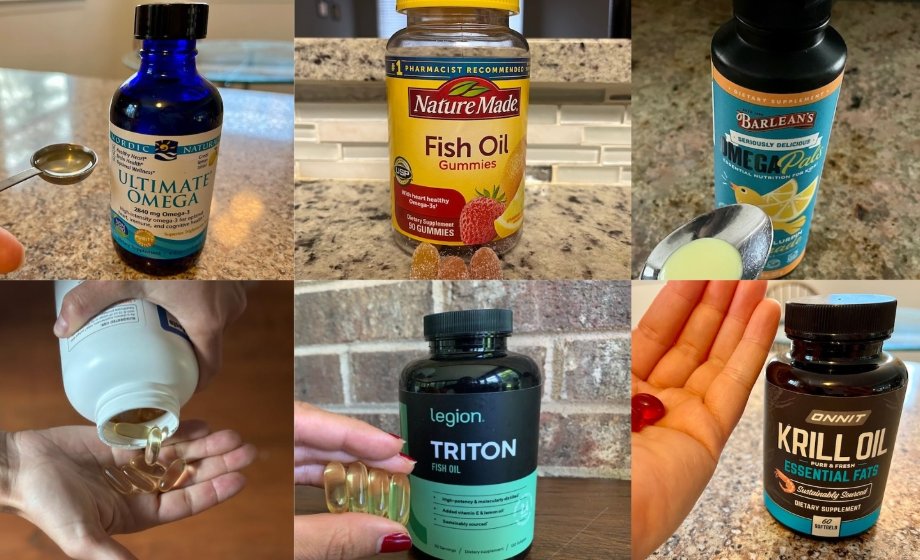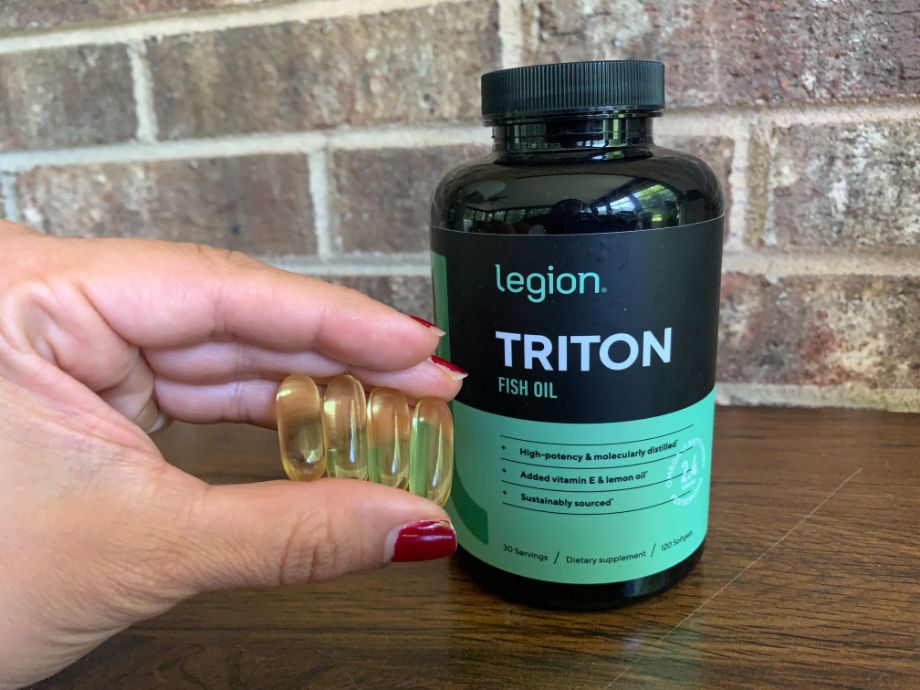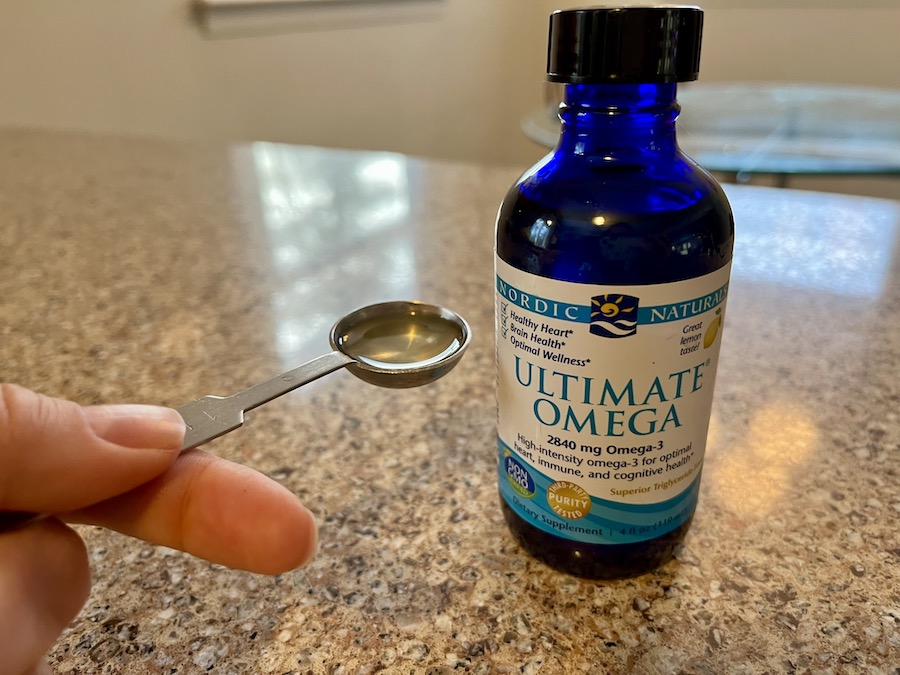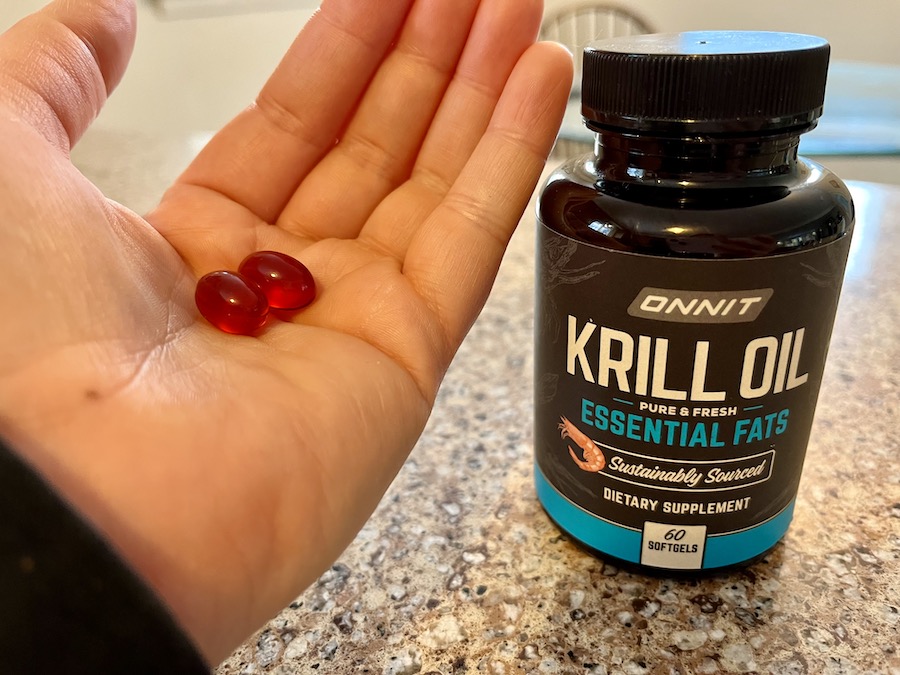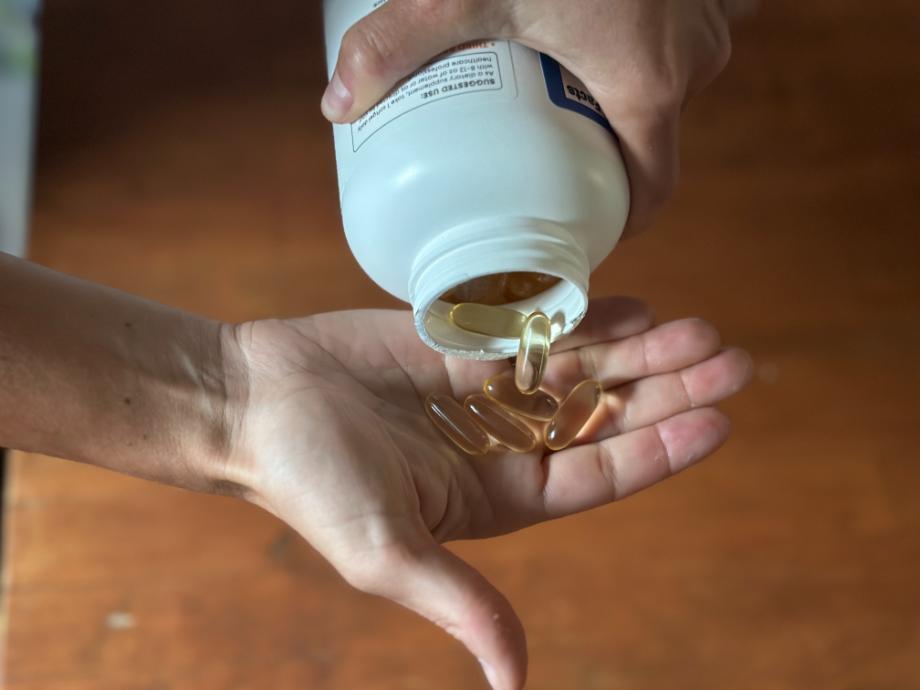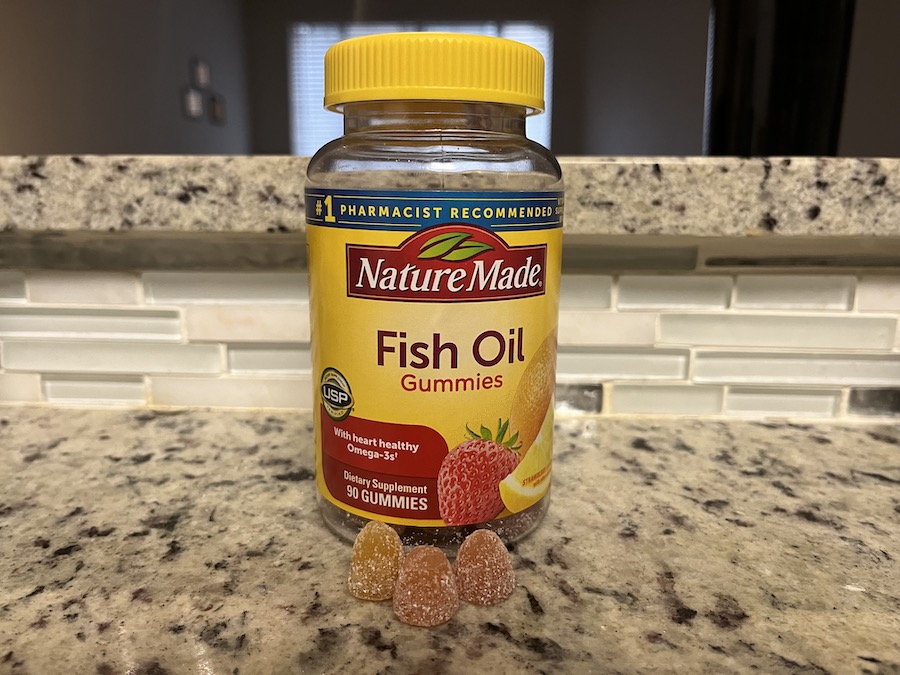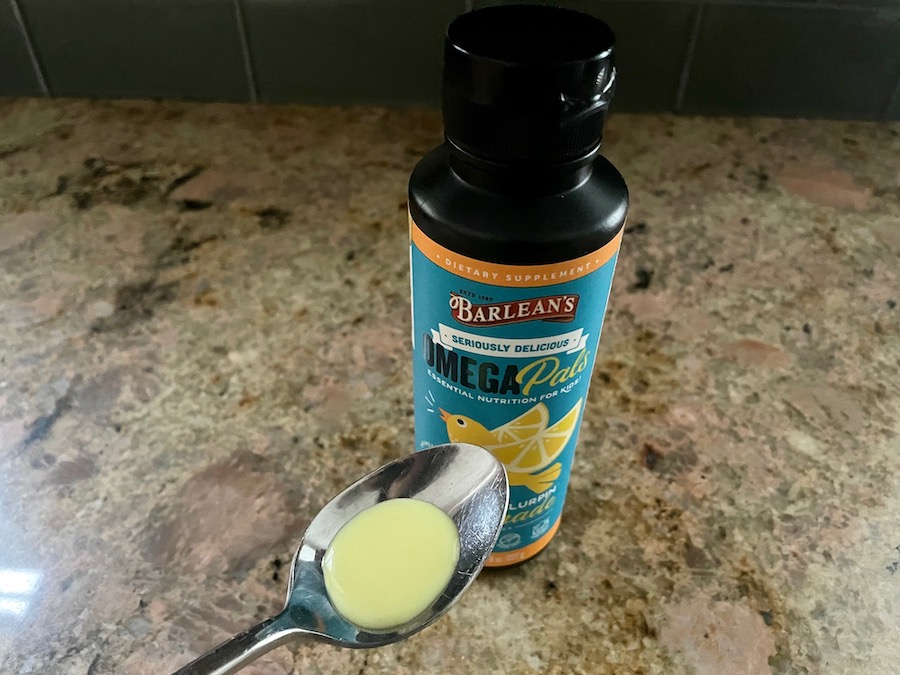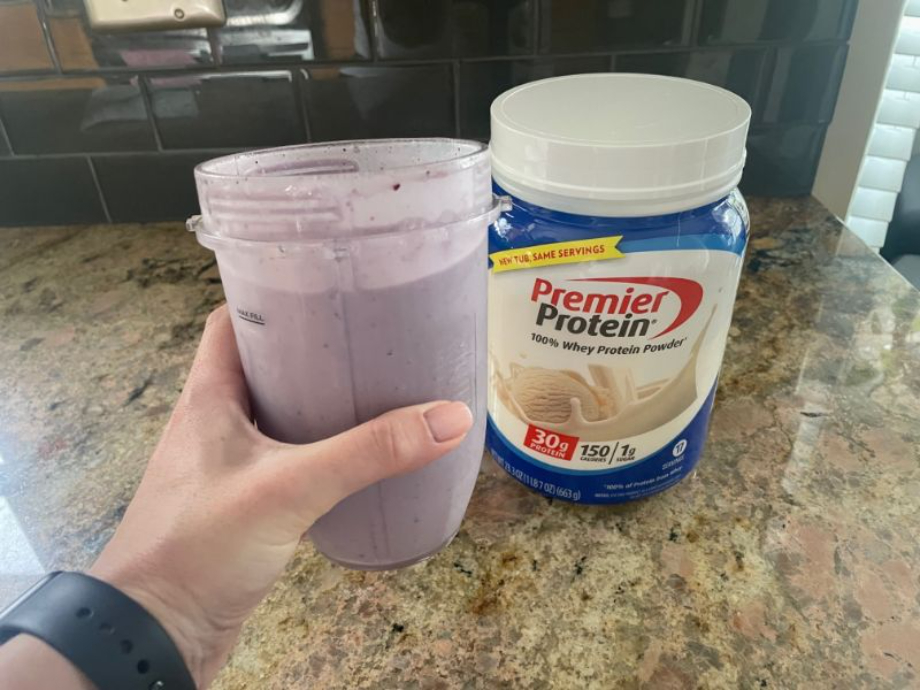Do you want to get stronger, start a podcast, and become a stand-up comedian like Joe Rogan? Then you’ve gotta keep reading…
Okay, maybe you won’t immediately be granted Hercules strength and a funny bone… But Joe Rogan’s supplement stack isn’t complete without fish oil and you might just catch some health benefits. However, fish oil products are similar to Joe’s epic home gym—plentiful with lots of options.
In a sea full of choices, how do you find the best fish oil supplement? Set sail on Voyage GGR as we navigate our top picks. Our testers are registered dietitians and sports nutrition experts who not only have extensive knowledge and experience in all things diet and health but actually have “sea” it to believe it. This means we actually test products like the best green powders, and testing fish oil is no different.
We ordered close to a dozen fish oil supplements and judged them on the following factors:
- Ingredients: Does it contain research-backed ingredients
- Dosage: Does it have enough omega-3s?
- Taste: Can you get it down?
- Price: Is it affordable?
Medical disclaimer: This article is intended for educational and informational purposes only. It is not intended as a substitute for medical advice. For health advice, contact a licensed healthcare provider.
Best Fish Oil Supplements in 2026
- Best Fish Oil Supplement Overall: Legion Triton Fish Oil
- Best Krill Oil Supplement: Transparent Labs Krill Oil
- Best Liquid Fish Oil Supplement: Nordic Naturals Ultimate Omega Liquid
- Best Omega-3 Supplement: Sports Research Omega-3 Fish Oil
- Best Softgel Fish Oil Supplement: Onnit Krill Oil
- Best Budget Fish Oil Supplement: Nutricost Fish Oil
- Best Vegan Fish Oil Alternative: Ora Organic Head & Heart Plant-Based Omega-3 Supplement
- Best Gummy Fish Oil Supplement: Nature Made Fish Oil Gummy
- Best Fish Oil Supplement for Kids: Barlean’s Omega Pals
- Best Fish Oil Supplement for Pregnancy: Garden of Life Prenatal Fish Oil
Best Fish Oil Supplement Overall: Legion Triton Fish Oil
Good for: People fishing for a high-dose fish oil in capsule form
Best Overall
Legion Triton Fish Oil
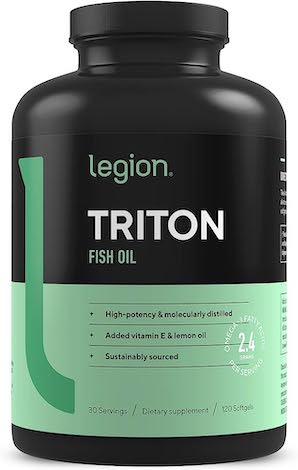
Product Highlights
- 100% reesterified triglyceride fish oil sourced from Peruvian anchovies and sardines
- Provides 4,000 mg of fish oil per serving
- Provides 1,440 mg of EPA and 960 mg DHA per serving
- Also contains vitamin E to prevent oxidation
Pros & Cons
Pros
- High doses of DHA and EPA
- Sourced from wild-caught fish
- Third-party tested
- Money-back guarantee
Cons
- Pricey compared to competitors
- Fishy smell and taste
Bottom Line
Legion's Triton fish oil is sourced from wild-caught anchovies and sardines, providing 4,000 milligrams of total fish oil with 1,440 milligrams of EPA and 960 milligrams of DHA. It's third-party tested and there are no fillers added.
Best Krill Oil Supplement: Transparent Labs Krill Oil
Good for: People curious about effective fish oil alternatives
Best Krill Oil
Transparent Labs Krill Oil
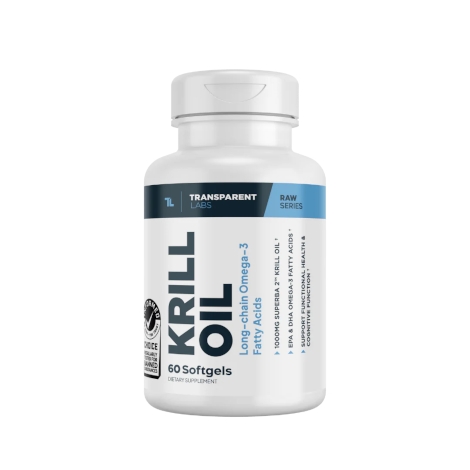
Product Highlights
- Antarctic krill oil supplement with Superba
- Listed benefits: supporting blood sugar and blood lipid balance, supporting the cardiovascular system, immunity, joints, and cognition
- No artificial colors, sweeteners, or GMOs
Pros & Cons
Pros
- Third-party tested and Informed Choice Certified
- Gluten-free, non-GMO, and no artificial sweeteners or colors
- Superba Krill OIl effectiveness supported by clinical trials
- No fishy aftertaste per customer reviews
- Sustainably sourced
Cons
- Limited customer reviews
- Uses softgel form, which contains gelatin
- Limited in store availability
Bottom Line
Transparent Labs Krill Oil contains 1,000 mg of Superba Krill oil and 220 mg of omega 3 fatty acids. According to Transparent Labs, krill oil is more bioavailable than other forms. Customer reviews are limited but positive. They noted that there is not a fishy taste, which is likely due to the natural vanilla flavor in the ingredients.
Best Liquid Fish Oil Supplement: Nordic Naturals Ultimate Omega Liquid
Good for: Fish oil seekers who prefer sippable supplements
Best Liquid
Nordic Naturals Ultimate Omega Liquid
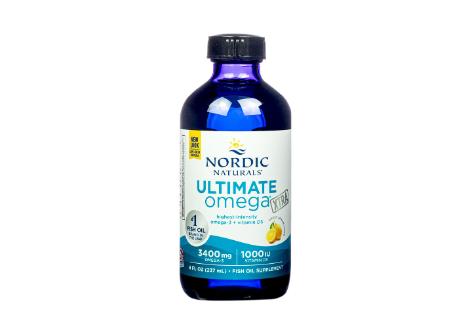
Product Highlights
- Liquid concentrate
- Triglyceride form is better absorbed by your body
- Non-GMO and third-party tested
- Over 10 industry awards
Pros & Cons
Pros
- Friend of The Sea-certified
- Better absorption
- No fishy aftertaste
- Doctor recommended
Cons
- Liquid can be messier than capsules
- Requires refrigeration
Bottom Line
Nordic Naturals Ultimate Omega in liquid form is a great alternative to pills. With clean ingredients and plenty of omega-3s, you are getting all the benefits in an easy-to-swallow package.
Best Omega-3 Supplement: Sports Research Omega-3 Fish Oil
Good for: Someone searching for a pure source of omega-3 fatty acids
Best Omega-3
Sports Research Omega 3 Fish Oil
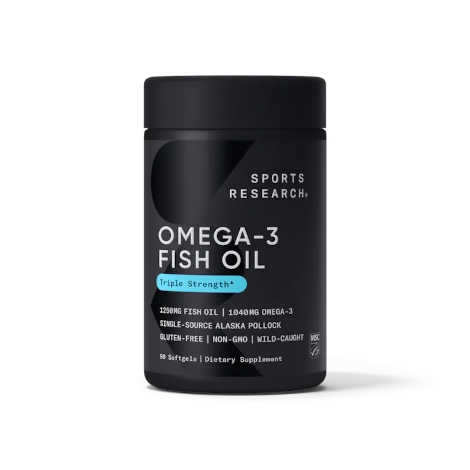
Product Highlights
- Omega 3 fish oil softgels
- Contains 520 or 1040 mg Omega 3 fatty acids depending on dosage
- Sourced from wild Alaskan pollock with a 10 step refinement process
Pros & Cons
Pros
- Satisfaction guaranteed when purchasing directly from Sports Research
- Subscribe and save 15%
- Offered in 2 dosages: 625 mg and 1250 mg
- Gluten-free, Non-GMO, and third-party tested
Cons
- Also contains tilapia to make softgel capsule
- Large pill size according to customer reviews
- Mixed reviews on “fishy” taste
Bottom Line
Sport Research Fish Oil is available in 2 doses 625 and 1250 mg. The fish oil is sourced from wild Alaskan pollock and IFOS 5 Star-certified, attesting to the quality and purity of the fish oil. The product has mostly positive reviews. However, both positive and negative reviews noted that the pills were very large and difficult to swallow. There were mixed reviews on whether the pills tasted fishy.
Best Softgel Fish Oil Supplement: Onnit Krill Oil
Good for: People needed an easy-to-swallow pill for their fish oil
Best Softgel
Onnit Krill Oil
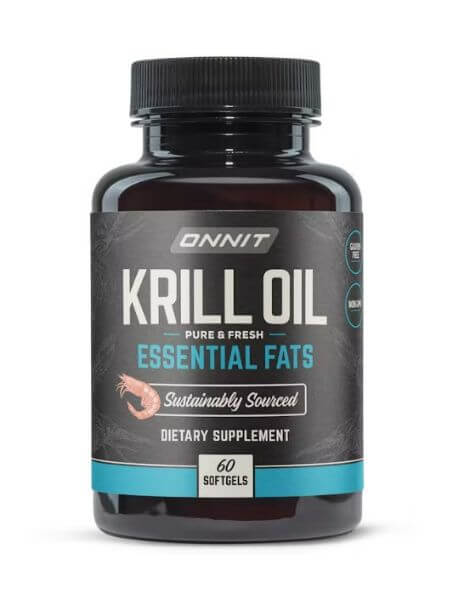
Product Highlights
- Phospholipids are easier for the body to absorb
- Carotenoids help support immune function
- Krill are harvested in the Arctic, away from industrial pollution
- Krill fishing is a sustainable, tightly regulated practice
Pros & Cons
Pros
- Easy absorption
- Fewer contaminants
- Contains healthy ingredients other fish oils do not (e.g., carotenoids)
- Vanilla flavor
Cons
- Not for those with shellfish allergies
- Must take with food
Bottom Line
Onnit Krill Oil is a great supplement for those looking to try something different or want added benefits in their omega supplement. Krill is a type of shellfish, so this supplement is not suitable for those with shellfish allergies.
Best Budget Fish Oil Supplement: Nutricost Fish Oil
Good for: Health- and finance-conscious consumers
Best Budget
Nutricost Fish Oil Softgels
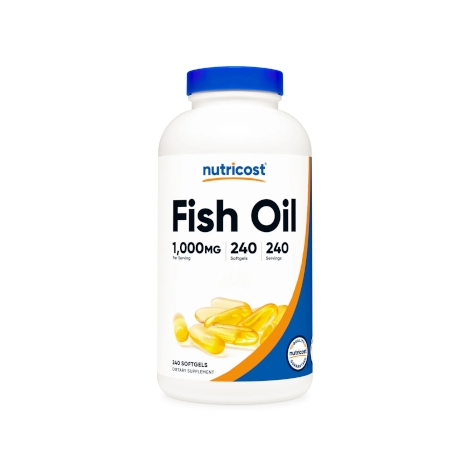
Product Highlights
- Fish oil supplement softgel
- 1,000 mg of fish oil
- 560 mg of Omega 3 fatty acids: 340 mg of EPA and 220 mg DHA
Pros & Cons
Pros
- 60-day money-back guarantee
- Non-GMO and gluten-free
- Manufactured in a GMP-compliant, FDA-registered facility
- Affordable at under $0.20 per serving
Cons
- Very limited reviews
- Mixed reviews on how “fishy” the pills taste
- Softgel contains gelatin
Bottom Line
Nutricost Fish Oil Softgels contain 1,000 mg of fish oil with 560 mg of combined docosahexaenoic acid (DHA) and eicosapentaenoic acid (EPA). There are not many reviews of this product, but they are very mixed. Customers disagreed on how “fishy” the pills tasted, ranging from “not at all” to “very fishy”.
Best Vegan Fish Oil Alternative: Ora Organic Head & Heart Plant-Based Omega-3 Supplement
Good for: Followers of vegan lifestyles searching for rich omega-3 sourcing
Best Vegan Alternative
Ora Organic Head & Heart Plant-Based Omega-3
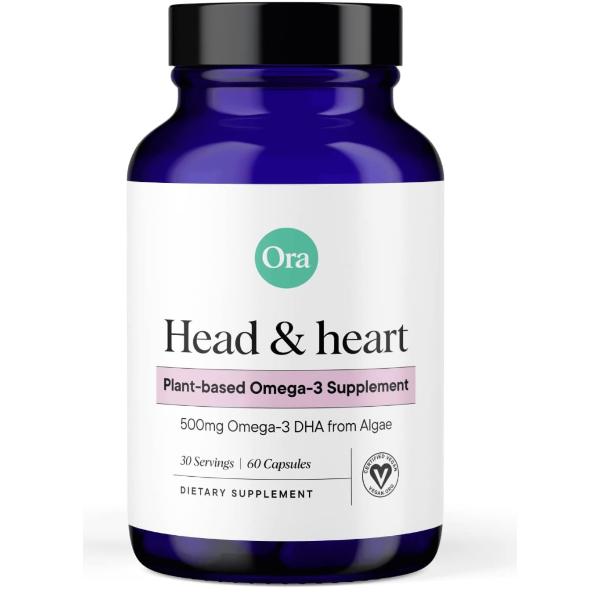
Pros & Cons
Bottom Line
Best Gummy Fish Oil Supplement: Nature Made Fish Oil Gummy
Good for: Kids at heart looking to support their hearts and health
Best Gummy
Nature Made Fish Oil Gummies
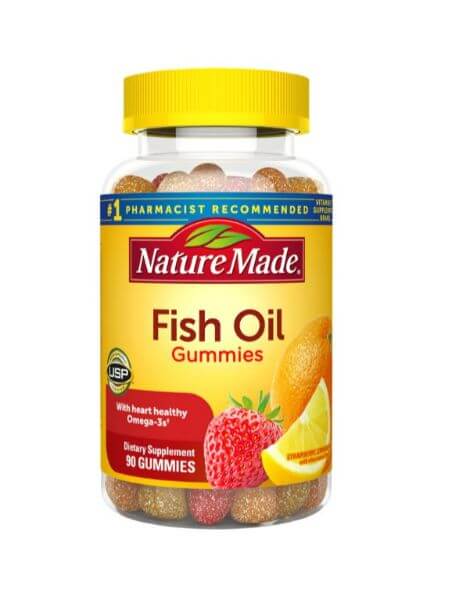
Product Highlights
- Gummies make taking fish oil easier
- USP-certified
- Contains both EPA and DHA
- Orange, lemon, and strawberry flavored
Pros & Cons
Pros
- Gummies can be easier to take than pills
- Widely available
- Relatively affordable
Cons
- Comparably low in omega-3s
- Fishy taste and smell is not completely masked
Bottom Line
Convenient and good-tasting, Nature Made Fish Oil Gummies are great for those looking for a daily supplement for heart health, but not ideal for those who need a higher dose of omega-3s.
Best Fish Oil Supplement for Kids: Barlean’s Omega Pals
Good for: The growing little fishies in the sea
Best for Kids
Barlean’s Seriously Delicious Omega Pals
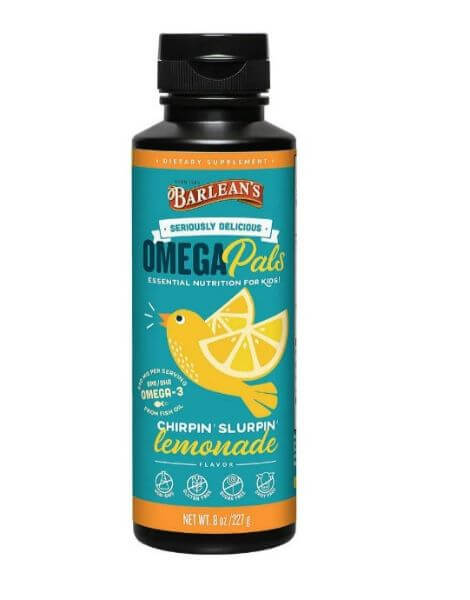
Product Highlights
- Liquid omega-3 supplement for kids to help brain development
- Can be taken alone or mixed in food or drink
- 3 fruit flavors to choose from that taste like smoothies, not fish
- Emulsified for better absorption
Pros & Cons
Pros
- Easier for kids (and adults) to swallow
- No artificial sweeteners or flavors
- Ultra-purified
- Can be mixed with fruit juice, smoothies, etc.
Cons
- Lemon flavor can be too sour for some
- Very oily texture
Bottom Line
Great-tasting and with the option to mix into food or drink, Barlean’s Seriously Delicious Omega Pals is a great option for omega supplements for kids.
Best Fish Oil Supplement for Pregnancy: Garden of Life Prenatal Fish Oil
Good for: Expectant mothers needing a fish oil supplement
Best for Pregnancy
Garden of Life Prenatal Fish Oil
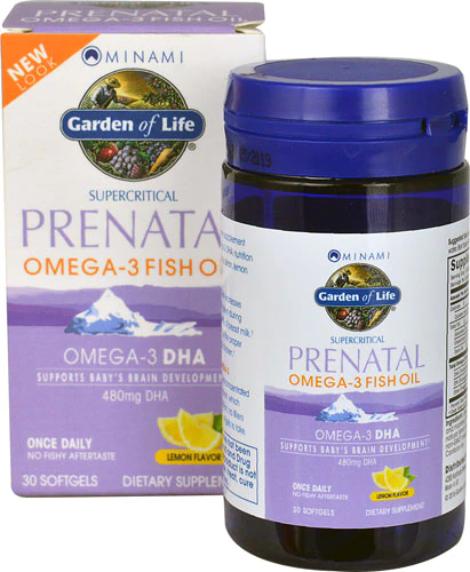
Product Highlights
- Prenatal fish oil supplement
- 640 mg total omega-3 fatty acids
- Serving size of 1 softgel
- Rigorous third-party testing ensures undetectable levels of mercury
Pros & Cons
Pros
- Sustainably sourced fish oils
- Inexpensive
- Serving size is 1 softgel
- Gluten-free and dairy-free
Cons
- Some reviews report mild fish burps
- Some reviews claim the pill was too large
Bottom Line
Garden of Life Prenatal Fish Oil is a fish oil supplement designed to give omega-3 fatty acids to expecting mothers to support a baby's brain development. With only one softgel per serving, the fish oil is made with a lemon flavor to avoid any fishy tastes to it.
Other Fish Oil Supplements We Tried and Researched
While we believe the products we picked are some of the best fish oil supplements on the market, others still have room on Voyager GGR! Additional supplements we tried, researched, and approved of include, but are not limited to:
- Bare Performance Nutrition Strong Omega
- Carlson’s The Very Finest Fish Oil
- HUM Nutrition OMG! Omega The Great
- Thorne Super EPA
- LifeForce Omega: LifeForce Omega has a decent amount of EPA and DHA, but it’s very expensive (around $75 for a one-month supply), there’s very little research on their other ingredients (such as omega-7), and no information about third-party testing or certifications.
RELATED: Best Whey Protein
How We Picked and Tested the Best Fish Oil Supplements
In a sea full of options, how did we pick our favorites? Instead of throwing out a wide net, we cast our line and reeled in the best fish oil supplements, mostly based on high-quality sourcing, variety, and the testing of each.
Sourcing and Bioavailability
Not all fish oil supplements are created the same, and we made sure to select products that are best supported by research. Specifically, we picked fish oils that offered the most bioavailability.
As we’ve mentioned throughout our top picks, wild-caught fish sources tend to offer more omega-3s compared to farm-fresh. We also mostly focused on fish oils in the triglyceride form, because it offers greater absorption compared to other forms like ethyl esters.
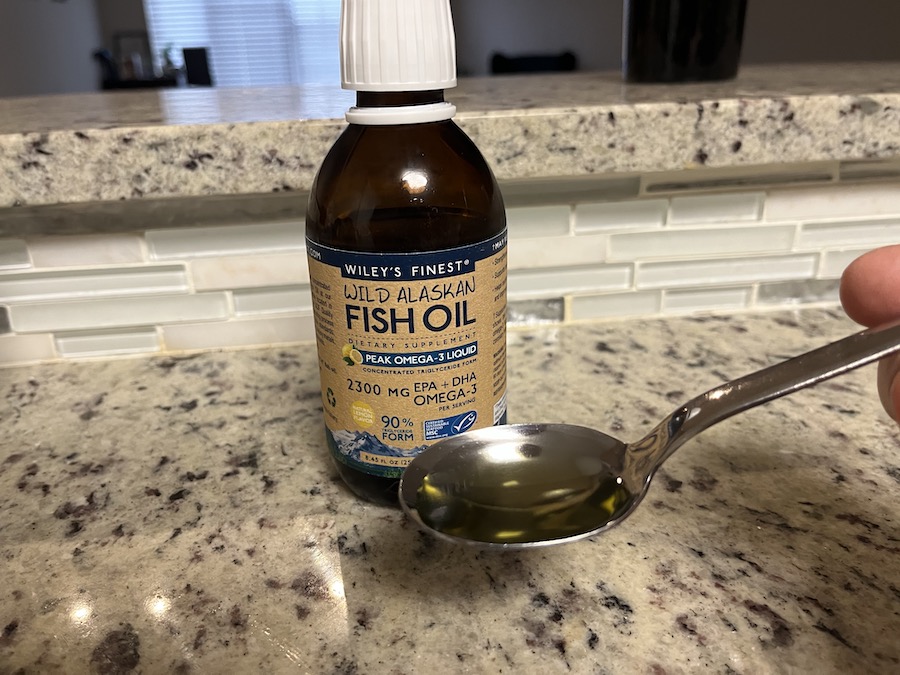
Variety
No person is the same—everyone has their own dietary needs, preferences, and goals. That said, we made sure to test and offer a wide net of reputable options.
Prefer a fish oil gummy (created for adults) over capsules? Try out Nature Made Fish Oil Gummy. Looking for an option for your kiddo? Barlean’s Omega Pals to the rescue!
Product Testing
Here’s the thing about supplements—while the Food and Drug Administration (FDA) regulates both finished dietary supplement products and dietary ingredients, they are not authorized to approve dietary supplements for safety and effectiveness. Or, supplements might contain sketchy ingredients in even sketchier doses.
But because we care about what we and you should put into our bodies, we are hyper-aware of whether or not products undergo third-party testing. Verifications through the USP and other third-party testers signify that the fish oil has been reviewed under specific safety and quality standards.
RELATED: Best Protein Shakes
Brand Reputation
How one feels about various brands is personal and can vary from one person to the next and that’s okay! For us, we select products based on brand trust and encourage consumers to be mindful of a brand’s reputation by:
- The quality and integrity of the brand’s products, including if they’ve been third-party tested
- Easily and readily accessible customer support
- Reviews consumers leave on their website and social media profiles, along with reviews on other seller sites such as Amazon
- Return policies
With most information readily available to us on the internet, it’s not too challenging to get a pulse of a brand’s reputation. No matter if we’re narrowing down the best creatine or fish oil, we make sure to take the extra step and evaluate the brand from various angles.
Third-Party Testing
Since dietary supplements are not approved by the FDA, having an independent third-party lab verify that what’s on the label is what’s in fish oil supplements is super important, especially for athletes. Transparency also plays a part in this—does the company provide COAs, not use proprietary blends, and generally seem very upfront about what’s used in their fish oil and why?
Fish Oil Supplement Testing Methodology
In addition to all of these criteria, we also rely on our GGR Supplement Testing Methodology to inform all of our supplement reviews, including this list of the best fish oil supplements. Our goal is to provide fact-based, research-backed reviews that will help you make the best decision about what supplements to put into your body.
Benefits of Taking a Fish Oil Supplement
The benefits of an omega-3 supplement are mostly tied to heart and brain health, although it can offer so much more. We took a deep dive into the research and were even more impressed with fish oil’s possibilities and applications.
Heart Health
Just as it’s nearly impossible to chat about best probiotics without bringing up gut health, the same rings true with omega-3s and heart health. We could dive into the benefits of omega-3s, EPA, and DHA for heart health all day; but we can’t leave the other fin-tastic health benefits sitting on the shoreline, so we’ll try to keep it (semi) brief…
A 2020 study published in Nutrients7 suggests omega-3s can modify a variety of cellular processes linked to lipid metabolism, inflammation, plaque build-up, and blood clots. Omega-3s have a notable role to lower triglyceride levels, which are a type of fat that can increase the risk of heart disease and stroke if levels are high in the blood.
According to a report published in Circulation8, treatment with omega-3 PUFA supplements is reasonable for patients with prevalent coronary heart disease (CHD) such as a recent heart attack. And another study7 shows fish oil supplements containing a total of 4.8 grams of EPA plus DHA may decrease triglycerides by 14.4% on average due to fish oil supplements containing a total for 4.8 grams of EPA plus DHA.
The 2020 study7 also compared EPA and DHA, further suggesting fish oil supplements with varied EPA/DHA ratios offer similar effects on total lipids. A similar systematic review6 suggests high DHA fish oil can protect the heart against heart attack and arrhythmias (irregular heartbeats) while improving heart function following a stroke.
A study published in Preventative Cardiology9 hints that recommending fish oil supplements to people with hypertension may be reasonable, too. Even if reductions in blood pressure are small, decreases of just 2 mmHg in systolic blood pressure have been estimated to cause a 10% lower stroke mortality and about 7% lower mortality for ischaemic heart disease or other vascular causes in middle age!
Truly, omega-3s and heart health go together like lamb and tuna fish (Big Daddy, anyone?) or maybe more so like Coop and home gym essentials. And overall, omega-3 fatty acids can improve triglycerides, blood pressure, cholesterol, and other risk factors for the leading cause of death in the entire world—otherwise known as heart disease.
Brain and Mental Health
Omega-3 fatty acids are vital components of phospholipids that form the structures of cell membranes, DHA being especially high in the brain. Research10 stresses the critical need for omega-3s and DHA for brain health, hinting that marine oil may benefit behavior, mood, and other brain disorders such as:
- Attention deficit hyperactivity disorder
- Autism
- Depression
- Borderline personality disorder (mood instability and impulsive aggression)
- Schizophrenia
- Hostility
- Anxiety
- Bipolar disorder
- Seasonal affective disorder
- Suicidal ideation
Overall, the researchers suggest taking a daily marine omega-3 supplement may be a cost-effective strategy for supporting brain and mood health.
Fitness Performance and Recovery
And of course we jump at the chance to talk about all things fitness. And we aren’t just grabbing at straws here—there truly is supporting evidence!
The anti-inflammatory effects of omega-3s have been hinted to reduce muscle soreness and enhance recovery and subsequent performance. Research published in the Journal of Sports Science & Medicine11 suggests 3,000 mg of omega-3 fatty acid supplementation can minimize the severe, delayed-onset muscle soreness that results from strenuous eccentric strength exercise.
Another study published in the Journal of Sports Science & Medicine12 details that DHA sourced from both fish and algal oils may reduce exercise-induced muscle soreness and stiffness while protecting against the loss of joint range of motion often caused by strenuous eccentric exercise.
The researchers tidy their data into a general suggestion: DHA is relevant to athletic populations to help facilitate recovery and allow for better performance during training and competition. DHA supplementation might also benefit non-athletic populations, including those starting new exercise programs and physical therapy patients more prone to muscle soreness.
Additional research7 suggests daily intake of high-DHA fish oil could be a useful adjunct to exercise programs aimed at improving body composition and decreasing cardiovascular disease risk in overweight individuals. Fish oil may improve heart rate at rest, as well as during and after exercise.
RELATED: Best Pre-Workout for Men
Other Possible Health Benefits
Cardiovascular and brain health tend to be at the core of the omega-3s’ health benefits. However, omega-3 EPA and DHA might also be effective for6:
- Preventing certain types of cancer, including breast and colorectal cancers
- Reducing the risks of cognitive decline, Alzheimer’s disease, and dementia
- Protecting against various eye diseases like age-related macular degeneration (AMD) and dry eye disease
- Improving arthritis symptoms such as joint pain, swelling, and stiffness
- Lowering allergy risks, especially in children
- Improving the quality of life for people living with multiple sclerosis13
- Bolstering the immune system and its functions
Needless to say, the potential benefits of fish oil and omega-3s are compelling. If you want to dip your toes in the fish oil waters, learn how to choose the best fish oil supplement for you next.
RELATED: Best Pre-Workout for Women
Potential Fish Oil Side Effects
Fish oil can have some side effects, with the most common being a fishy aftertaste, or fish breath, often called the fish burps. This is more of a nuisance than a danger to your body, however.
What can be an issue is that fish oil can thin the blood, which could mean you’ll bleed longer if you happen to get a cut. If you’re on a blood thinner medication already, this could be problematic. Make sure to consult your doctor before starting a fish oil supplement.
How to Choose the Best Fish Oil Supplement for You
If interested in adding a high-quality fish oil to your supplement shelf, how do you choose? The picks above offer great starting points, but you can narrow your selections to choose the best fish oil for YOU with these tips.
Evaluate Your Health Needs and Goals
This is where we tell you to discuss your health needs and goals with your doctor, dietitian, and/or another healthcare professional. Their expertise can help guide you to a fish oil they believe will provide you with an effective and safe dose.
For instance, while the Food and Agriculture Organization of the United Nations recommends a dose of 250 milligrams per day of EPA plus DHA for most adults, the AHA recommends 2 to 4 grams per day for patients requiring triacylglycerol (TAG) lowering11. Needless to say, dosing can wildly differ based on specific goals, and it’s best to dose responsibly.
Different populations also have varying omega-3 recommendations and needs, including pregnant women, children, and older adults. High doses of omega-3s could increase the risk of bleeding, which is especially concerning for those already taking a blood thinner, so it’s important to discuss these details with a healthcare team.
Identify Your Dietary Needs and Preferences
Whether you’re dealing with a fish allergy or following a vegan diet, it’s important to identify your dietary needs and preferences and match them to an oil right for you. In these aforementioned cases, algae omega-3 oil would be a great option.
Fish oil comes in various forms—like softgels, liquids, and gummies—so factor in your intake preference. If worried about any fishy smell or taste, go for a flavored option such as Nordic Naturals Ultimate Omega Liquid’s lemon-flavored fish oil.
Also, check out the dosing and serving sizes. If you need a higher dose, you might consider getting a more concentrated fish oil to lower the number of capsules to take.
Review the Brand and Product Label
Just as we tested out products, factoring in the brand and product, we encourage you to do the same. Key callouts and takeaways include:
- Look for the DHA and EPA on the back product label. This is because most fish oils only list the TOTAL omega-3s or fish oil (like 2,000 mg of fish oil) on the front. The number appears enticing, but it often does not represent the EPA and DHA the supplement contains.
- Review the sourcing of the oil, including if the fish is wild-caught and in the absorbable triglyceride form.
- Evaluate whether or not the product has been third-party tested and certified.
- Inspect the brand as a whole, looking specifically for a positive customer track record and accessible customer support resources.
Test and Assess
It’s not so uncommon to take a supplement and assume it’s doing its job. However, we encourage you to track your supplement journey just as you would track your workouts and fitness progress and adjust accordingly.
While taking and after taking the fish oil consistently, track any noticeable effects. Evaluating can be as subjective as “I feel like my mind is sharper!” and as concrete as reducing your blood triglycerides.
After tracking your progress, assess whether or not the fish oil has been worth your while. If not, the beauty is that many other options are on the market that might be worth hooking onto!
Fish Oil Alternatives
If you’re following a vegan or vegetarian diet, you’ll need an alternative or two to get your source of fatty acids. ALA omega-3 supplements are created using plant-based oils from flax, chia seed, walnuts, hemp, canola oil, and more. They’re available as standalone supplements or can be combined with fish oil supplements.
Another alternative is C15:0, an essential fatty acid in the supplement Fatty15. This fatty acid has been linked to overall health and longevity.
Best Fish Oil Supplements FAQ
Do cardiologists recommend fish oil?
Board-certified cardiologist Dr. Todd Hurst tells WebMD that whether or not you should take fish oil depends on who you ask. However, he advises his patients a high dose of omega-3 can be effective in lowering high triglycerides while the benefits of a lower dose are likely small. Like our testers at GGR, he also encourages finding a high-quality supplement manufactured by a reputable company.
Like most nutrition experts, Dr. Hurst encourages a food-first approach to not only obtain omega-3 fatty acids, but also protein, vitamin D, and other nutrients sourced from fish that fish oil lacks. According to the AHA, we should be aiming for two servings of fatty fish per week.
Even despite the general tug of war regarding the risks and benefits of fish and fish oil—such as fish offering protein and other trace minerals while fish oil being more convenient to consume without great mercury risk—we always fall back on “supplements are meant to supplement a balanced diet and not replace it.”
Which fish’s fish oil is the best?
Research4 suggests the most abundantly produced and available fish oils globally are from anchovies, menhaden, and herring. The most commonly studied is anchovy oil, although all are characterized by higher concentrations of EPA than DHA.
Is it better to take omega-3 or fish oil?
Both omega-3 and fish oil play a role in a healthy diet. The biggest difference between omega-3s and fish oil is that all fish oils contain omega-3s whereas not all omega-3s are sourced from fish. Think of omega-3s as the umbrella that could also encompass algae and flax oils in addition to fish oil. Regardless, both omega-3s and fish oil are great sources of EPA and DHA, healthy fats that can lower triglycerides.
How much fish oil should I take each day?
This is very individual, but the reference daily intake (RDI) of DHA and EPA is 250 to 500 milligrams, while the RDI of omega-3s is 1,600 milligrams for adult men and 1,100 milligrams for adult women. These numbers will change for children, older adults, and pregnant or breastfeeding women.
Who should not take fish oil supplements?
According to Mayo Clinic, if you’re taking blood pressure drugs, blood thinners, birth control pills, or weight loss drugs, fish oil may interact and cause issues. Speak to your doctor before starting any fish oil supplements.
These statements have not been evaluated by the Food and Drug Administration. This product is not intended to diagnose, treat, cure, or prevent any diseases.
References
- Epitropoulos, A. T., Donnenfeld, E. D., Shah, Z. A., Holland, E. J., Gross, M., Faulkner, W. J., Matossian, C., Lane, S. S., Toyos, M., Bucci, F. A., Jr, & Perry, H. D. (2016). Effect of Oral Re-esterified Omega-3 Nutritional Supplementation on Dry Eyes. Cornea, 35(9), 1185–1191. https://doi.org/10.1097/ICO.0000000000000940
- Rundblad, A., Holven, K. B., Bruheim, I., Myhrstad, M. C., & Ulven, S. M. (2018). Effects of krill oil and lean and fatty fish on cardiovascular risk markers: a randomised controlled trial. Journal of nutritional science, 7, e3. https://doi.org/10.1017/jns.2017.64
- Davinelli S, Nielsen ME, Scapagnini G. Astaxanthin in Skin Health, Repair, and Disease: A Comprehensive Review. Nutrients. 2018;10(4):522. Published 2018 Apr 22. doi:10.3390/nu10040522
- Venn-Watson, S., & Schork, N. J. (2023). Pentadecanoic Acid (C15:0), an Essential Fatty Acid, Shares Clinically Relevant Cell-Based Activities with Leading Longevity-Enhancing Compounds. Nutrients, 15(21), 4607. https://doi.org/10.3390/nu15214607
- Venn-Watson, S. K., & Butterworth, C. N. (2022). Broader and safer clinically-relevant activities of pentadecanoic acid compared to omega-3: Evaluation of an emerging essential fatty acid across twelve primary human cell-based disease systems. PloS one, 17(5), e0268778. https://doi.org/10.1371/journal.pone.0268778
- Ghasemi Fard S, Wang F, Sinclair AJ, Elliott G, Turchini GM. How does high DHA fish oil affect health? A systematic review of evidence. Crit Rev Food Sci Nutr. 2019;59(11):1684-1727. doi: 10.1080/10408398.2018.1425978. PMID: 29494205.
- Yang ZH, Amar M, Sampson M, et al. Comparison of Omega-3 Eicosapentaenoic Acid Versus Docosahexaenoic Acid-Rich Fish Oil Supplementation on Plasma Lipids and Lipoproteins in Normolipidemic Adults. Nutrients. 2020;12(3):749. doi:10.3390/nu12030749
- Siscovick DS, Barringer TA, Fretts AM, Wu JH, Lichtenstein AH, Costello RB, Kris-Etherton PM, Jacobson TA, Engler MB, Alger HM, Appel LJ, Mozaffarian D; American Heart Association Nutrition Committee of the Council on Lifestyle and Cardiometabolic Health; Council on Epidemiology and Prevention; Council on Cardiovascular Disease in the Young; Council on Cardiovascular and Stroke Nursing; and Council on Clinical Cardiology. Omega-3 Polyunsaturated Fatty Acid (Fish Oil) Supplementation and the Prevention of Clinical Cardiovascular Disease: A Science Advisory From the American Heart Association. Circulation. 2017 Apr 11;135(15):e867-e884. doi: 10.1161/CIR.0000000000000482. Epub 2017 Mar 13. PMID: 28289069; PMCID: PMC6903779.
- Campbell F, Dickinson HO, Critchley JA, Ford GA, Bradburn M. A systematic review of fish-oil supplements for the prevention and treatment of hypertension. Eur J Prev Cardiol. 2013;20(1):107-120. doi:10.1177/2047487312437056
- DiNicolantonio JJ, O’Keefe JH. The Importance of Marine Omega-3s for Brain Development and the Prevention and Treatment of Behavior, Mood, and Other Brain Disorders. Nutrients. 2020;12(8):2333. doi:10.3390/nu12082333
- Jouris KB, McDaniel JL, Weiss EP. The Effect of Omega-3 Fatty Acid Supplementation on the Inflammatory Response to eccentric strength exercise. J Sports Sci Med. 2011;10(3):432-438.
- Corder KE, Newsham KR, McDaniel JL, Ezekiel UR, Weiss EP. Effects of Short-Term Docosahexaenoic Acid Supplementation on Markers of Inflammation after Eccentric Strength Exercise in Women. J Sports Sci Med. 2016;15(1):176-183.
- AlAmmar WA, Albeesh FH, Ibrahim LM, Algindan YY, Yamani LZ, Khattab RY. Effect of omega-3 fatty acids and fish oil supplementation on multiple sclerosis: a systematic review. Nutr Neurosci. 2021;24(7):569-579. doi:10.1080/1028415X.2019.1659560


